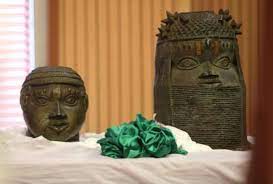BERLIN (AFP): Germany handed back more than 20 looted artefacts to Nigeria on Tuesday, saying it was to “right a wrong” more than 100 years after they were stolen by British colonial troops.
Thousands of 16th to 18th century metal plaques, sculptures and objects — hailed as some of the finest African art — were ransacked by British forces from the ancient Kingdom of Benin and ended up in museums and art collections across the US and Europe.
Germany’s return of part of the hundreds of bronzes it still holds comes as international momentum grows for the restoration of African artefacts from other former colonial powers Britain, France and Belgium.
German Foreign minister Annalena Baerbock travelled to Nigeria’s capital Abuja to personally hand over the objects, which included figureheads and other artefacts.
“What we are returning is a part of your history, what we are returning is a part of who you are,” Baerbock said at the ceremony with Nigerian officials.
“We are here to right a wrong.”
Many of the Nigerian artefacts were originally taken in 1897, when a British military expedition attacked and destroyed Benin City, making off with thousands of metal and ivory sculptures and carvings.
A new online archive “Digital Benin” (https://digitalbenin.org/) has started to provide a centralised hub of images and descriptions of more than 5,000 artefacts held in 131 institutions around the world.
The project, which began planning and research two years ago, was launched last month in Benin City, in southern Nigeria’s Edo State, the heart of the former Benin Kingdom.
Nigeria’s neighbour Benin earlier this year inaugurated an exhibition of artworks and treasures returned by France after two years of negotiations.
Those 26 pieces were stolen in 1892 by French colonial forces from the capital of the former Kingdom of Dahomey.
The Kingdom of Benin, which despite its name was located in what is now southwest Nigeria, traces its roots back to the first century BC.
It expanded through military conquest and commerce, which with the arrival of Europeans in the 16th century developed into trade in slaves, ivory and spices.







